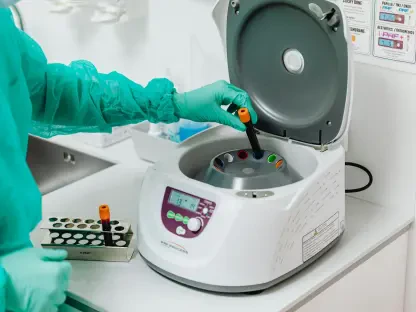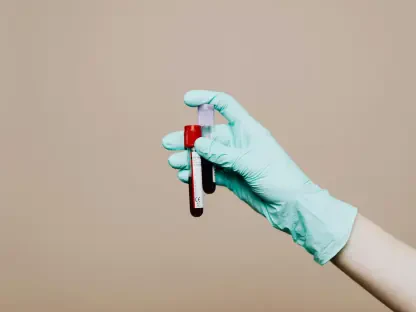Amid rising concerns over national security and economic self-reliance, the U.S. Congress has introduced the BIOSECURE Act. Aimed at curbing Chinese influence in the biotechnology sector, this legislation prevents companies with Chinese ties from accessing federal funding. While the Act promises security, it raises questions about its impact on innovation, economic competition, and the broader biotech landscape.
Understanding the BIOSECURE Act
Legislative Background and Intent
The BIOSECURE Act emerges against a backdrop of increasing tensions between the U.S. and China. Legislators argue that safeguarding national security justifies restricting Chinese companies’ participation in federal programs. The Act mandates stringent vetting processes to prevent sensitive health data from falling into the wrong hands. The intertwining of health data protection with national security concerns represents a significant pivot in U.S. policy, creating a legal framework that fundamentally alters how biotechnology companies engage in cross-border collaborations.
The legislative intent behind the BIOSECURE Act is multifaceted. On one hand, it seeks to secure American genetic data from potential misuse by foreign entities, particularly those with close ties to the Chinese government. On the other, it underscores the urgency to develop a more self-reliant biotech industry, capable of thriving without depending on foreign partnerships that might compromise national security. This dual focus reflects the complex geopolitical landscape and the need for robust policies to navigate it, balancing security concerns with the imperative to remain competitive in a fast-evolving scientific domain.
National Security and Genetic Data
A core motivation for the BIOSECURE Act is the protection of American genetic data. Lawmakers stress that access to this data by foreign actors represents a significant threat. This section delves into the specific concerns related to data privacy, potential espionage, and the strategic importance of bioinformatics. With genetic data becoming increasingly central to medical research and innovation, the stakes are high. Advanced genomics and bioinformatics capabilities enable not just therapeutic advancements but also the potential for malevolent applications, making the safeguarding of genetic databases a national priority.
National security experts argue that the integration of foreign firms in the biotech sector could facilitate unauthorized access to genetic information. Such access can have far-reaching implications, from bioweapon development to exploiting vulnerabilities in genomic healthcare treatments. These risks, though complex and somewhat speculative, drive the stringent measures proposed in the BIOSECURE Act. The protection of this data is not merely a healthcare issue but a strategic move to insulate America’s biomedical advances from adversarial exploitation. By enacting these protective measures, the U.S. signals its intent to safeguard both its citizens’ health data and its strategic interests in biotechnology.
Balancing National Security and Innovation
Potential Risks to Biotechnology Innovation
While national security is a valid concern, the BIOSECURE Act might stifle innovation by severing critical partnerships with Chinese biotech firms. This section examines industry apprehension about how the Act could delay clinical trials and increase the costs of drug development. The potential for slowed progress in biotechnology innovation is substantial. Companies often engage in international collaborations to leverage diverse expertise, streamline research processes, and bring therapies to market more efficiently. By restricting these partnerships, the Act could inadvertently impede scientific advancement and delay the introduction of new medical treatments.
Industry experts argue that the proposed decoupling from Chinese firms could lead to significant resource allocation challenges. The biotech sector thrives on collaborative efforts, and the disruption of these relationships could result in an extended period of adjustment. Companies may face increased operational costs and potentially long delays in initiating and completing clinical trials. Given the meticulous nature of drug development, these setbacks could have a cascading effect, increasing the overall cost of healthcare innovations and diminishing the sector’s competitiveness in the global market.
Industry Voices and Concerns
Key figures in the biotech industry, like Radoje Drmanac of Complete Genomics, argue that the legislation interferes with scientific progress. We explore these perspectives, assessing the validity of their concerns and the potential longer-term impacts on U.S. biotech innovation. Drmanac and other industry leaders stress that geopolitical tensions should not be allowed to compromise the pace of scientific discovery. The BIOSECURE Act, by prioritizing security over innovation, might limit access to vital international resources, technologies, and collaborative opportunities essential for cutting-edge research.
Furthermore, companies express concerns about the legislative approach’s fairness and its potential to foster monopolistic practices within the domestic market. If Chinese firms are excluded from participating, fewer companies may dominate specific niches, potentially stifling competition and innovation. The apprehension is that the Act could lead to an insular approach, where policy overrides scientific and economic pragmatism. These industry voices call for a more balanced strategy that protects national interests without undermining the collaborative spirit essential for scientific advancements.
Economic and Market Implications
Competition with Chinese Biotech Firms
The BIOSECURE Act also aims to bolster the U.S.’s competitive edge against Chinese biotech companies. However, U.S. firms worry about the economic and logistical hurdles posed by disentangling from established Chinese partnerships. This section discusses the broader economic ramifications and the potential shift in market dynamics. American biotech companies have long relied on their Chinese counterparts for various aspects of the development cycle, including manufacturing, clinical trials, and research. The sudden severance of these ties could necessitate significant restructuring, both logistically and financially.
Moreover, the competition between U.S. and Chinese biotech firms spans not only technological advancements but also market presence. By enforcing restrictions, the U.S. risks pushing Chinese companies to strengthen their global footprint independently, potentially accelerating their growth in markets outside the U.S. This strategic realignment could see American firms losing ground internationally, facing stiffer competition in regions where they once held sway. In essence, the BIOSECURE Act, while intending to secure national interests, may inadvertently catalyze a competitive disadvantage for U.S. biotech companies on the global stage.
Supply Chain Challenges
Transitioning manufacturing and development closer to home could be a lengthy and complex process. U.S. companies argue that years are needed to adjust scientifically and regulatory-wise. We explore how this shift might affect the biotechnology ecosystem and whether it could lead to increased costs and supply chain vulnerabilities. The biotech sector is highly integrated, and the transition from established, cost-effective Chinese partnerships to domestic alternatives is fraught with challenges. Regulatory hurdles, quality control, and the development of new supply chains involve substantial time and investment.
Companies like Eli Lilly have highlighted the difficulties in relocating complex manufacturing processes and the scientific rigor required to meet U.S. regulatory standards. This process is not only expensive but also time-consuming, potentially leading to temporary supply chain disruptions and increased production costs. Furthermore, the need to comply with stringent quality control measures can slow down the transfer of technology and knowledge, critically impacting the timely delivery of new drugs. This shift in the supply chain may also create gaps that could be exploited by competitors, both domestic and international, further complicating the market landscape.
Perspectives from Congress and Industry
Bipartisan Legislative Support
Broad bipartisan support for the BIOSECURE Act in Congress reflects a collective urgency to counter Chinese influence. This section details the legislative perspectives and the various arguments for why lawmakers believe the Act is crucial for national security and economic resilience. Republican lawmakers strongly emphasize the need to protect Americans’ genetic data from potential access by the Chinese government, viewing it as a paramount national security concern. They argue that the Act forms a necessary shield, preventing sensitive information from falling into the hands of foreign powers that could misuse it.
On the other hand, Democratic lawmakers echo these sentiments but also caution against blanket legislation. They emphasize the role of due diligence in naming specific companies and ensuring that the legislative measures do not unfairly target firms without substantive evidence. This bipartisan consensus underscores a shared recognition of the strategic importance of the biotech sector. Lawmakers assert that safeguarding this industry is essential not only for national security but also for maintaining economic resilience and technological leadership in the global arena. The Act, thus, is seen as a critical instrument in achieving these objectives.
Industry Advocacy and Opposition
Not all stakeholders are on board with the BIOSECURE Act. Some argue it unfairly targets specific companies and could have unintended negative consequences. This segment highlights the differing opinions within Congress and among industry advocacy groups, providing a balanced view of the debate. Industry bodies like BIO support the Act, asserting that it addresses critical national security issues and offers a reasonable timeframe for companies to adjust to the new norms. They argue that the proactive measures are necessary to curb potential risks and ensure a robust defense against strategic adversaries.
Conversely, critics within the industry and among some lawmakers caution against the potential unforeseen economic impacts. They argue that blanket restrictions could undermine America’s biotech competitiveness and innovation. Rep. Jim McGovern, for instance, warns that without a nuanced approach, the Act might result in significant negative economic and scientific repercussions. He calls for legislative measures that protect national interests without compromising the collaborative framework that propels scientific progress. This ongoing debate highlights the complexity of aligning national security with economic and scientific imperatives.
Impact on Clinical Trials and Drug Development
Challenges in Drug Development
Delays in clinical trials and increased costs are significant concerns highlighted by industry experts. This section delves into how the BIOSECURE Act might hinder the pace of drug development, affecting patient care and healthcare costs. Clinical trials are an integral part of the drug development process, and any disruptions or delays can have a profound impact on the timeline for bringing new therapies to market. The disentanglement from Chinese partnerships may result in logistical challenges, limited access to advanced research facilities, and a potential slowdown in trial commencement.
Companies have voiced concerns about the cascading effects this legislation could have on the entire drug development ecosystem. The increased costs associated with establishing new, compliant clinical trial arrangements domestically may lead to higher overall development expenses. This could, in turn, affect the pricing of new drugs and therapies, making them less accessible to patients. The ripple effect on healthcare costs is significant, as delays and increased financial burdens can strain the healthcare system and impede timely patient care.
Long-term Implications for Healthcare
In light of growing concerns over national security and economic autonomy, the U.S. Congress has introduced the BIOSECURE Act. This legislation aims to limit China’s influence within the American biotechnology sector by restricting companies with Chinese connections from receiving federal funds. While the Act is designed to enhance national security by safeguarding critical biotechnological advancements from foreign control, it also introduces a number of complexities. Experts worry about its potential ramifications on the pace of innovation, given that the biotechnology industry thrives on global collaboration and funding. Additionally, the Act could intensify the existing trade tensions between the U.S. and China, impacting economic competition. The broader biotech landscape may experience a shift, with American companies potentially losing valuable partnerships and insights that international collaborations often bring. Balancing the Act’s intended security benefits with its possible drawbacks on innovation and economic vigor remains a significant challenge for policymakers.









